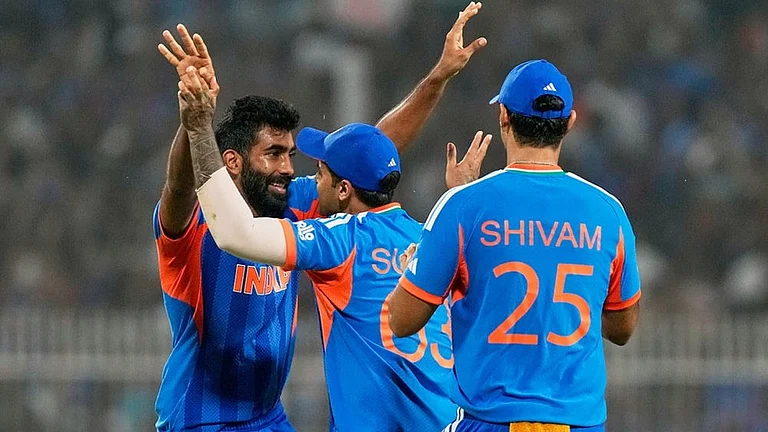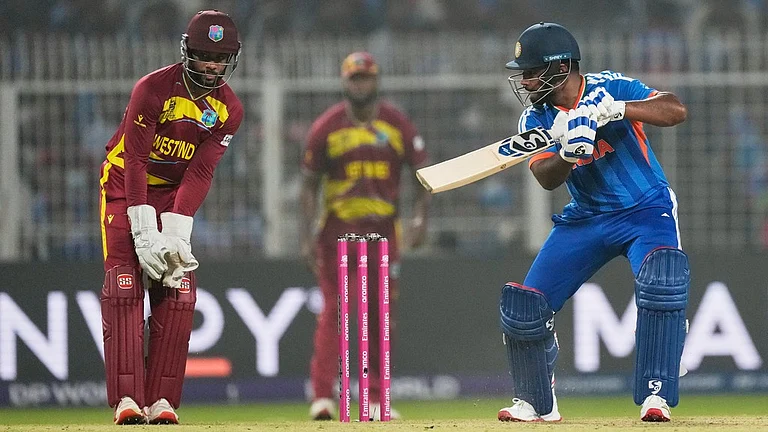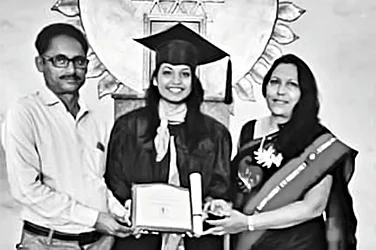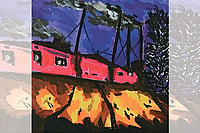ON my arrival in Karachi, Nani asked me to sit beside her on the sofa. Nani is my wife Mona’s maternal grandmother. She told me that she was throwing a party that night in my honour. Nani wanted me to meet everyone in the family. The guests, she said, had been informed of Mona’s marriage to me the previous year. She said in Urdu: "I told them that the groom is from Hindustan. And then I told them, ‘He has accepted Islam.’"
Nani said that people had congratulated her. "Sabhi mujhe mubarakbad dene lage. Kehne lage ki Mona ko jannat milegi (Everyone began congratulating me. They began saying Mona will be assured a place in heaven)." I think Nani knew that I did not think of myself as a Muslim. Her account about the guests for the dinner that night was her way of orienting me to her world.
That evening, the people I met were polite and even affectionate. Many of them did not call me by my usual name. They called me Safdar. When dinner was over, one guest, my mother-in-law’s cousin, turned in my direction and asked loudly, "Safdar, how did your parents take the news of your conversion?"
It was difficult for me to tell her that I had never thought that I had converted although, if folks wanted to talk about it, I was not opposed to being considered a convert either. As to my parents, I didn’t know what they thought. I hadn’t told them anything at all.
"Marriage among Hindus is no simple matter," wrote Mahatma Gandhi in his autobiography. But, in the case of my marriage, distance had made matters very simple. My parents and most of my family were in India. I was living in New Haven in the US. I was the only one making decisions.
It was only when I was at Mona’s parents’ home in Toronto, deep into the discussion of dates suitable for our marriage, that I decided to inform my parents of my decision to marry. I called them in India to give them the news. At that time, Mona’s father was still in Karachi. When I went up to Toronto, Mona’s father was visiting from Pakistan. Mona’s mother had moved to Canada the previous year. She already had a teaching job and was now waiting for her husband to join her. Mona’s family is a well-to-do liberal family; Asma Jehangir, the human rights lawyer, is her mother’s first cousin; on the father’s side, they are distant relatives of General Pervez Musharraf.
Two years before that phone call from Toronto, I had told my parents in a letter of my having met Mona in New York City. I had written that she was a Muslim—and a Pakistani. Then, I had called my parents to talk to them. My father had rightly anticipated that I might be concerned about their opposition to my being in love with a Muslim. He came to the point immediately. "You have our blessings," he said. My mother too could not say no. But she had been a bit reluctant. She said: "Yes...but can’t you find anyone from...?"
Later, when I called them from Toronto, the war in Kargil had already begun. My mother asked me what Mona’s family thought of the war. She said: "Woh log us tarah ke Musalman to nahin hain na (They are not those kind of Muslims, are they)?" A suitable gloss on that would perhaps be: "They are not fanatical, are they?" On more than one occasion, I have heard people close to me in my family say that Muslims are fanatics.
Ten days later, I was married. Several of Mona’s relatives came to the wedding. I was alone on the groom’s side. It was a bright, warm day. Mona and I went to the marriage registrar’s office. Inside the building, there were many offices. Mona, wearing a blue silk sari, walked to the window marked ‘Tax and Water Inquiry’, and then we were pointed in the right direction. An Irishman now settled in Canada officiated. He filled out our religions, ‘Hindu’ and ‘Muslim’, on the marriage form and asked: "Isn’t that a bit like a Catholic marrying a Protestant back where I’m from?"
We also had a brief Islamic ceremony at Mona’s parents’ home. One of her uncles officiated as the qazi. Both Mona and I were required to just say "yes" thrice to the question about our intent to marry. There were two lines from the Quran the qazi asked me to repeat after him. I did so, haltingly. The name that was used for me during this ceremony was Safdar Ali. The previous week, I had got a call from Toronto. Mona sounded a little upset, and then her mother came on the line. I was asked to choose a Muslim name. I was told that in Pakistan, the marriage of a Muslim to a non-Muslim is not recognised. So, it was suggested that I perhaps choose a name that could be used during an Islamic ceremony. Mona’s mother thought the name ‘Aftaab’ would be suitable because it resembled my present name. I said no. I chose the name ‘Safdar’ after Safdar Hashmi, the dynamic, young theatre-activist who had been killed on the streets outside Delhi by political goons.
I was a little disturbed by all this. Was this a conversion? No one from Mona’s family had actually used the word. It is possible that they didn’t want to think in those terms, just as I didn’t, though that is what they wanted it to be.
But, I also had the opposite thought. In the subcontinent, we increasingly identify ourselves in religious terms. The erosion of pluralism means that we participate in a kind of negative identification. As Eqbal Ahmad put it, this means saying that "we are so-and-so because we are not the Other. We are what we are because we are different from the West, or from the Muslims, or from the Hindus, or from the Jews, or from the Christians." In such a scenario, doesn’t conversion promise the presence of more people in society who would have roots in many communities?
During my visit to Karachi, a boy I met first apologised for posing a personal question, and then asked me if I had converted. I repeated to him the lines of poetry my friend Ajai Singh had written in Lucknow: "Main aadha Hindu hoon, aadha Musalman hoon,/Main poora Hindustan hoon (I’m half a Hindu, half a Muslim/I’m all of India)". I told the boy about Nani calling me Safdar. I was also the one who responded to the name I’ve had since I was a boy. I wasn’t only one or the other; I was prepared to be both.
Perhaps, conversion is not the right word for what I have in mind; it has more to do with a notion of plural identities. But conversion does help me attack the intransigent border between religions.Maybe my choice of the word is also partly to protest V.S. Naipaul’s dismissal, in Beyond Belief, of all Muslims who are not Arabs as "converts". He writes that Muslims in a country like India, because they are converts to Islam, have an unreal sense of who they are. Their condition, Naipaul writes, has "an element of neurosis and nihilism". This implies that Muslims have no local histories, they’re only tied to an elsewhere in Arabia. It erases the centuries of adaptation and growth of Islam in places like India; it also plays into the hands of the bigots in India who don’t tire of calling present-day Muslims "outsiders" or "invaders". Against Naipaul’s idea of purity and fixity in religion, it’s necessary to see how communities have grown historically in dialogue with each other. Their influences are mixed and shared. If you go far back in time, surely all of us are converts.
In recent years, in India at least, the idea of conversion has become a political scandal. Right-wing Hindu fundamentalists have whipped up the rhetoric of Hinduism under attack by saying that Muslims and Christian minorities are converting poor Hindus. Theirs is a far cry from what writer Intizar Husain said: "I’m a Muslim, but I always feel there is a Hindu sitting inside me... I still feel I’m an exilé who wanders between Karbala and Ayodhya." Born in India, Husain migrated to Pakistan post-Partition. I was struck by the beauty of his words, and his sense of sublime rootlessness. In his worldview, the sense of belonging to different, distant, places was not a sign of neurosis but humanity. Unlike Naipaul—born in the diaspora, and repulsed by what he had once considered home—Husain celebrates his ties to the places that are a part of his past; even his exile’s a pleasant longing for the places he belongs to.
After my return from Karachi, I visited poet and film director Gulzar in Mumbai. Over dinner, Gulzar, a Hindu, told me he had been fasting for Ramzan for several years. A Muslim friend of his had been advised by his doctor to avoid the strain, and so Gulzar offered to keep a fast instead. I wanted to tell Gulzar: "You should stop keeping the fast. It’s my turn now."
(Amitava Kumar is the author of Passport Photos, Penguin India.)

























